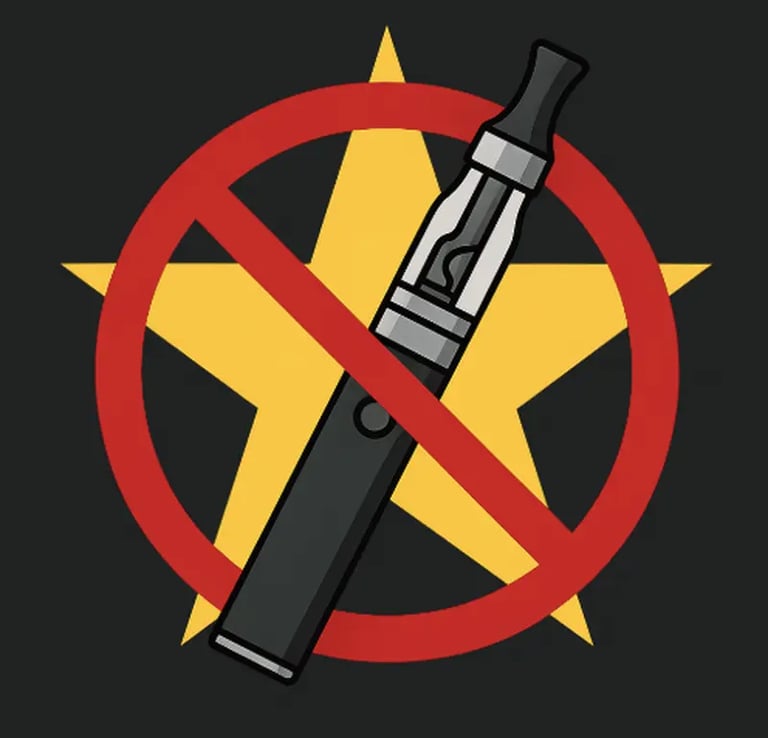Local Laws in Vietnam in 2025: What Every Foreigner Absolutely Needs to Know
Everything you need to know about local laws in Vietnam in 2025: bans on e-cigarettes, drugs, alcohol, road safety regulations, sensitive zones, nighttime noise, city management, prohibited medicines and foods. Risks and penalties for foreigners
BLOG VIETNAM
6/2/20256 min read


Vietnam remains an appealing destination for foreigners, but its legal system is strict and evolving. In 2025, several new laws and bans have come into effect, increasing penalties for violations related to drugs, alcohol, e-cigarettes, prostitution, food and medicine importation, road safety, and visa overstays. Foreigners are strongly advised to understand and respect these laws to avoid heavy fines, incarceration, deportation, or blacklisting.
Criminal Statutes and Punishments in Vietnam: What Foreigners Should Know in 2025
Vietnam’s legal system is strict, especially when it comes to matters involving foreign nationals. Understanding how statutes, punishments, and jurisdiction work in this country is essential for avoiding serious legal trouble.
Being Charged with a Crime in Vietnam
If a foreigner is charged with a criminal offense in Vietnam, the process is governed by the national penal-code. Offenses range from misdemeanors to serious felonies such as first degree homicide or aggravated assault.
Once a formal indictment is issued by the prosecutors, the accused must prepare a criminal-defense, often through a licensed defense attorney.
Types of Crimes and Punishments
Vietnamese statutes distinguish between unlawful actions that are administrative (infractions) and those that are criminal. Common infractions may result in fines, while criminal acts can lead to state-prison or county jail time.
Misdemeanors: Minor crimes often punished with fines or short-term confinement
Felonies: More serious offenses such as trafficking, firearm possession, or violent crimes, which may be punished by long sentences or life imprisonment
If someone has been convicted, they may be sentenced to county jail or state-prison, depending on the severity and legal classification of the offense.
Degrees of Criminal Offenses
While Vietnam doesn’t explicitly use first degree, second degree, or third degree terminology, many comparative legal discussions refer to:
First degree: Premeditated and intentional crimes (e.g., murder)
Third degree: Lesser, often spontaneous offenses with reduced penalties
Legal consequences are defined under each subsection of the penal-code, and law-enforcement agencies strictly enforce these laws.
Youth Offenders and Indecent Crimes
Cases involving juvenile offenders are treated with more leniency, though certain indecent or violent crimes may still result in detention. Vietnamese law seeks to rehabilitate youth while maintaining public safety.
Legal Process and Pleas
After arrest, the defendant has the right to plead guilty or not guilty. Unlike Western systems, Vietnam’s criminal trials are more inquisitorial than adversarial.
A defense attorney can help mitigate punishments or negotiate alternatives like probation, but severe crimes often carry mandatory sentences.
Bodily Harm and Aggravated Assault
Any action resulting in bodily injury, especially during a fight, may be considered an aggravated offense. These are often punished more harshly, even if the harm was not intentional.
Law enforcement takes such violations seriously, and a conviction may lead to confinement and deportation for foreigners.
Firearms and Illegal Possession
Possession of a firearm is heavily restricted in Vietnam. Unauthorized ownership is an unlawful act and may lead to severe punishment, especially if associated with criminal intent or gang activity. Violators can expect immediate arrest and long-term state-prison sentencing.
Conclusion: Know the Law Before You Go
Foreigners in Vietnam fall under full jurisdiction of Vietnamese law. Whether you're dealing with a traffic infraction, an accusation of theft, or a serious charge like homicide, the legal system will impose strict penalties if found guilty.
The safest path is to stay informed, avoid risky behavior, and consult a local defense attorney if you're ever involved in a legal issue.
Total Ban on E-Cigarettes
As of 2025, e-cigarettes are fully banned in Vietnam. The law prohibits the production, sale, import, transport, storage, and use of vaping devices, including heated tobacco products.
This public health measure targets rising addiction rates among youth.
Penalties are strict:
Up to $4,000 in fines for production or trade
Up to $12,000 or 3 years in prison for storage or transport
Personal use may result in confiscation and fines, but repeated offenses or intent to distribute can lead to criminal prosecution
Drugs: Zero Tolerance
Vietnam applies zero tolerance for drug-related offenses. Trafficking significant amounts (e.g., over 600 grams of heroin or methamphetamine) can result in the death penalty or life imprisonment without parole.
Simple possession: 2 to 7 years in prison or more
Foreigners may be deported after serving their sentence
Any drug charge results in a criminal record, affecting future entry
Nitrous Oxide Ban (Laughing Gas)
Since January 1, 2025, nitrous oxide (N₂O) is banned for recreational use. This follows increased medical incidents linked to abuse.
The law bans production, trade, import, transport, storage, and recreational use
Penalties range from $500 to $1,100 in fines, with potential jail time in serious or repeat cases
Medical use remains allowed under strict regulations
Alcohol Laws and DUI
Alcohol consumption is legal, but drinking in public institutions (schools, hospitals) is banned. Driving under the influence (DUI) is treated very seriously.
Fines range from $700 to $2,000 depending on intoxication level
Additional penalties: license suspension, mandatory road safety courses, or jail time in case of accidents
Repeat offenders face criminal charges
Overstay Penalties
Overstaying a visa is a serious administrative offense in Vietnam.
Short overstays: Fines of $20–$50 per day
Long overstays: Risk of deportation, entry bans, or even criminal charges in extreme cases
To resolve the issue, visit the Immigration Department, pay fines, and request an exit visa
Road Safety and Driving Offenses
In 2025, Vietnam has tightened road safety laws.
Running a red light: Up to $800 in fines
Driving under the influence: Up to $2,000 in fines, license suspension, or jail
Serious accidents or repeat offenses: Felony charges with mandatory sentencing
Sensitive Areas and Border Zones
Border areas near China, Laos, and Cambodia are under heightened surveillance. Foreigners caught smuggling or carrying illegal items in these regions may face:
Detention
Prosecution
Deportation
Noise and Nightlife Regulations
Vietnam is cracking down on nighttime noise, especially in urban centers like Ho Chi Minh City.
Mobile karaoke, bars with loud music, and street parties face penalties
Fines apply for noise complaints, and repeat offenses may result in incarceration (suspended or not)
Prohibited Foods and Medicines
Meat, dairy, fruits, and vegetables may be confiscated at customs if undeclared.
Banned medicines include:
Painkillers (tramadol, codeine, morphine)
Anxiolytics (Valium, Xanax)
Certain antidepressants, hormonal treatments, and cough syrups with codeine
Even with a prescription, carrying these may result in confiscation, arrest, or temporary detention.
Prostitution: Legal and Criminal Aspects
Prostitution is illegal in Vietnam.
Sex workers face administrative fines ($4 to $40) and may be placed in rehabilitation centers
Pimps and organizers face 6 months to 15 years in prison
Clients may be fined and subject to administrative sanctions
Foreigners risk deportation and blacklisting
Common Offenses Involving Foreigners
Theft and fights: Pickpocketing is common, but street fights can lead to misdemeanor or felony convictions, depending on the injuries caused
Drug use: Several foreigners have been imprisoned for cannabis possession
E-cigarettes: Confiscation and fines apply; intent to distribute is a felony
Criminal Law Reform in 2025
Vietnam has increased penalties across many areas:
Drug offenses, counterfeiting, food safety, hygiene
Death penalty abolished for 8 crimes, replaced by life imprisonment without parole
Summary
Vietnam in 2025 enforces strict laws on drugs, e-cigarettes, DUI, prostitution, overstays, and more. Foreigners must remain cautious and compliant to avoid severe consequences: jail time, fines, deportation, or permanent bans. All Vietnamese cities and regions are under state control, with administrative reforms underway. Particular caution is required in border zones and when handling controlled substances.
⚖️ FAQ – Crime & Law in Vietnam (2025)
Can a foreigner be convicted of drug use in Vietnam?
Yes — even small quantities can lead to prison time and deportation.
What are the penalties for pimping?
Between 6 months and 15 years in prison, often with heavy fines.
Is prostitution legal?
No — foreigners risk fines, imprisonment, deportation, and blacklisting.
Which cities are state-administered?
Hanoi, Ho Chi Minh City, Da Nang, Hai Phong, Hue, and Can Tho.
What are the DUI penalties for foreigners?
Fines of $700–$2,000, license suspension, and jail in severe cases.
Which medicines are prohibited?
Codeine, tramadol, Valium, Xanax, certain antidepressants, and hormonal drugs.
Are e-cigarettes allowed?
No — production, transport, or sale can result in fines up to $12,000 or 3 years in prison.
What are the penalties for nighttime noise?
Fines and, in repeat cases, several months of jail time.
What is an offender?
A person who has committed a criminal offense, subject to prosecution.
What are felonies?
Serious crimes like murder or drug trafficking, punishable by long prison terms or life imprisonment.
What is a plea?
A formal response to charges — guilty pleas can influence sentencing.
Who is the prosecutor?
A state official who prosecutes crimes in court.
Are there crime degrees (first-, second-degree)?
No exact equivalents — severity and intent determine the penalty.
What happens after conviction?
Sentencing may include prison, fines, probation, or restitution.
Is bail available?
Rare — pre-trial detention is more common in Vietnam.
What is a controlled-substance offense?
Illegal possession or trafficking of drugs with mandatory prison sentences.
Is restitution required?
Yes — courts may order compensation to victims.
What does “knowingly” mean legally?
It refers to having intent or awareness of committing a crime.
Is manslaughter recognized?
Yes — although not labeled the same, unintentional killing is punishable by law.
Travel
Asia Blog – Practical tips about Vietnam, Thailand, South Korea, Cambodia... visas, eSIMs, banking, travel budget, and more.
© 2025. All rights reserved.
